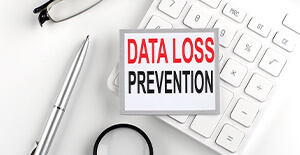How to Choose the Best Antivirus Software
Simplify your search for an antivirus software with this guide.
read morePublished on: February 1st, 2023

These days, most businesses are responsible for some form of data management. We often think of data prevention to safeguard personal or financial information, trade secrets, or other intellectual property, but data loss prevention (DLP) is important for almost every business. From baseline efforts to back up critical data to robust DLP solutions, discover best practices in data loss prevention for businesses.

While bigger businesses have more data and, consequently, bigger breaches, smaller companies are often easier targets for cybercriminals. Because of this, it is critical to have data protection in place, regardless of your business size.
At a minimum, your organization needs backups of any sensitive information and any data that is critical to business continuity. That way, you can get things up and running, mitigate issues more quickly, and, hopefully, avoid a brand disaster in case of a breach. There are many different types of backups, but the two main options are:
Within these two types, there are a number of varieties of ways to back up information. Additionally, some companies use a combination of Cloud and local backups for their sensitive data.
Once you’ve established a backup plan, it’s time to assess your data security. The correct solution for your business will depend on several factors. For example, are you expected to meet specific mandates or compliance regulations? Is your main goal to protect IP? Are stakeholders interested in understanding data in motion in your organization? With your answers in mind, you can start to dive into ways to manage and maintain DLP.
Encrypting personally identifiable information and company IP can help thwart cybercriminals. While this step doesn’t mean you can skip other security practices, it can significantly reduce the risk of bad actors being able to use data – even if they can get their hands on it.
Assigning access to sensitive data based with multi-factor authentication or user-based access can significantly lessen the risks of a data breach. Classifying your information as structured and unstructured data, confidential information, intellectual property, etc., can help you set policies based on the level of sensitivity.
On that note, it’s critical to set expectations and educate your employees. Insider threats and errors from staff utilizing personal or insecure devices or programs are major causes of data loss. Make sure your team is aware of expectations when sending or downloading different types of data, and put security measures in place to issue reminders or alert your security teams.
Last but not least, there are DLP tools that can help manage your data security. Most modern solutions can detect and respond to risks in real-time without service interruption. Of course, the right choice will depend on your business’ systems, needs, and budget.
Keeping up with best practices in data loss prevention and protection can be a real challenge, particularly for small to mid-size businesses. If you need help determining the right solution and keeping your cybersecurity up to date, consider reaching out to your local Computer Troubleshooters. Our IT experts can assist you in finding the right security, support, and backup solutions to keep your business running smoothly.
Simplify your search for an antivirus software with this guide.
read moreHave you received this notorious Windows error screen? Here’s how to fix it.
read more© 2025 Computer Troubleshooters.